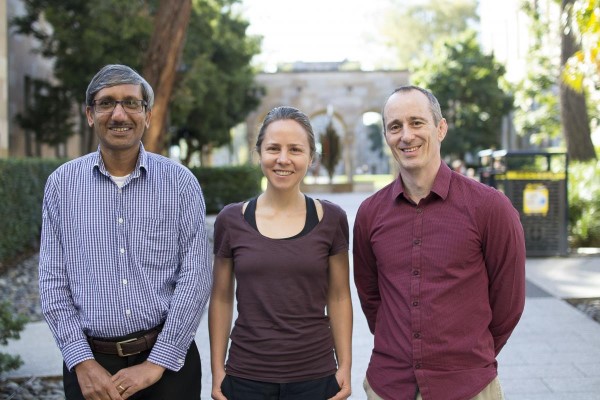
Semi-conductors, quantum mechanics and prime numbers are among the areas to be explored in prestigious UQ fellowships awarded to three School of Mathematics and Physics staff members in the 2016 round.
UQ Fellowships aim to foster development of promising early career researchers and retain mid-career and senior academic staff of exceptional calibre at the University.
UQ Fellowships awarded to SMP academics are:
Dr Magdalena Zych will conduct research-teaching in the field of complex quantum systems at the interplay with general relativity. Her fellowship aims to provide a theoretical description and enable experimental exploration of a so-far untested physical regime where quantum theory and general relativity both play a role. “I am particularly interested in new phenomena which arise when the notions such as time and causality require relativistic as well as quantum description” Dr Zych said. “We have some intriguing examples of quantum effects from time dilation, but a big picture is really missing.” Results are expected to contribute to the search for the unified theory of quantum gravity, considered one of the biggest challenges in modern physics. The research may also shed new light on one of the key questions in the foundations of quantum theory: how does the classical world emerge from the quantum?
Prof Ole Warnaar will conduct research on the topic of Selberg-type integrals. Such integrals play a fundamental role in our understanding of a wide variety of problems in mathematics and physics, ranging from the distribution of the primes to dualities in string theory. Ole Warnaar is one of the world’s leading experts on the Selberg integral, and settled the type A case of Mukhin–Varchenko, a conjecture concerning the existence of Selberg integrals for arbitrary simple Lie algebras, the only case of this conjecture resolved to date. Discretising the various Selberg integrals and constructing the underlying discrete probability distributions is an important open problem whose resolution will impact on a wide range of areas of mathematics and physics.
Dr Ebinazar Namdas will undertake a research-industry partnership in the area of next-generation hybrid semiconductors and light-emitting devices. Semiconductors are amongst the most important high-tech materials, being ubiquitous in modern electronics, including computers, memory chips and displays. While most semiconductors are made from inorganic compounds such as silicon or gallium arsenide, organic semiconductors based on carbon have attracted widespread interest for their novel properties. The first commercial product that arose out of organic semiconductors with widespread interest is the display technology used in the OLED TV and a large number of smart phones. His fellowship aims to develop a new breed of hybrid organic-inorganic semiconducting devices that have the potential to simplify the existing display technologies and significantly reduce production costs.



